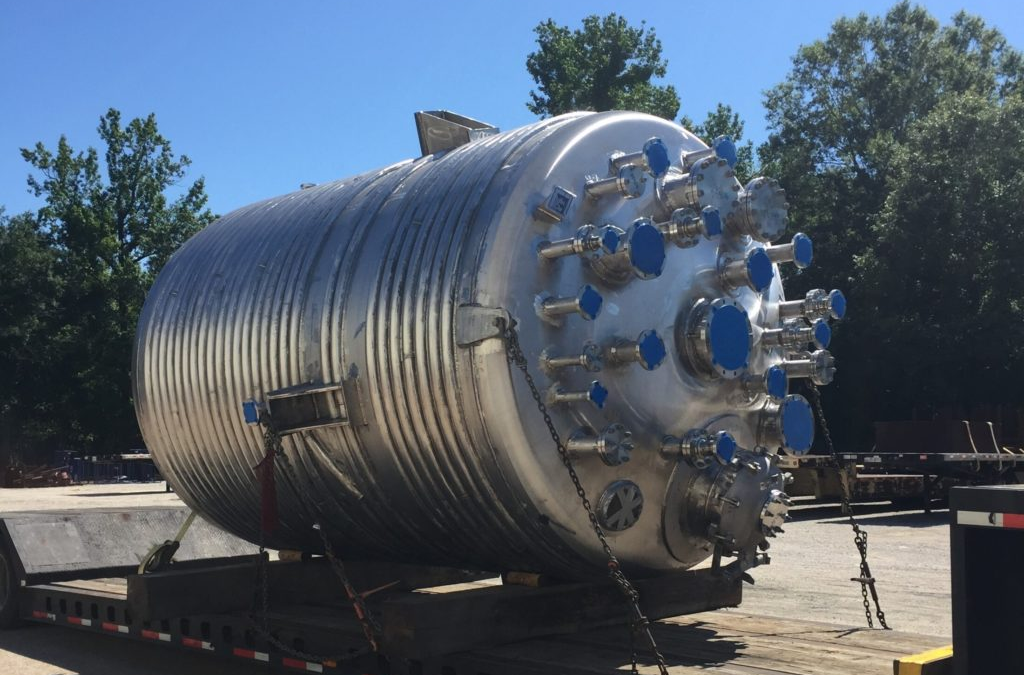Pressure vessels are storage tanks that are designed to maintain a pressurized environment. These vessels are used in many industries and applications to contain things like hazardous waste, petrochemicals, flammable liquids, and much more.
Due to the volatile nature of pressurized containers and their contents, regulations for pressure vessel fabrication are necessarily stringent. OSHA requires that pressure vessels meet certain standards, as leaking or damaged vessels can cause health, safety, and ecological hazards. The API and ASME also have codes defining proper fabrication and maintenance of pressure vessels for this reason.
The nature of pressure vessels and the requirements for these containment systems make the material used for pressure vessel fabrication of the utmost importance for maintaining compliance and optimal function of the vessel, given its specific application. While pressure vessels are made of many different materials—including chrome, steel, aluminum, nickel, fiberglass, and even plastic—here is the run-down on four of the best materials for pressure vessels: titanium, nickel alloys, stainless steel, and carbon steel.
Titanium Pressure Vessels
Titanium Benefits
Titanium has several unique benefits that suit it to use for pressure vessel construction. Not only is titanium resistant to corrosion and easy to clean and maintain, but it is also non-toxic in its natural form—meaning that titanium is biocompatible (compatible with and not harmful to living tissues), a crucial characteristic for many industries’ applications. Titanium is strong and durable, maintaining its structural integrity, with tensile strength ranging from 30,000 psi to 200,000 psi (210-1380 MPa). It also has a higher melting point than steel and many other materials.
Titanium Pressure Vessel Applications
Titanium-fabricated pressure vessels are frequently used in sectors such as:
- Energy
- Chemical
- Oil and gas
- Pharmaceutical
- Agricultural
- Fertilizer
Nickel Alloy Pressure Vessels
Nickel Alloy Benefits
Pressure vessels fabricated from nickel alloys have long lifespans due to the performance characteristics of such alloys. They resist corrosion and have ideal oxidation and carburization levels, allowing for use in harsh, inhospitable environments. Nickel alloys offer protection from thermal expansion to both the contents of the vessel and the vessel itself.
There are many different nickel alloys to choose from, depending on the specific application and desired performance characteristics. Alloys known for their high performance include Monel, Hastelloy, Inconel, Alloy 20, and Haynes Alloys, among others.
Nickel Alloy Pressure Vessel Applications
Pressure vessels fabricated from nickel alloys have myriad uses across industries such as:
- Fertilizer
- Chemical
- Fine chemical
Stainless Steel Pressure Vessels
Stainless Steel Benefits
Stainless steel is beneficial as a material for pressure vessel fabrication because of its performance characteristics and versatility. Stainless steel is durable and can withstand both very high and low temperatures, as well as high pressures, direct sunlight, and humidity. It resists rust, stains, and a wide array of chemicals, which enhances its lifespan and allows it to be easily cleaned for use in applications requiring a high level of purity.
Stainless Steel Pressure Vessel Applications
Given its versatility and durability, stainless steel pressure vessels have numerous use cases across many industries. Some notable applications include:
- Food and beverage
- Pharmaceutical
- Energy
- Chemical
- Cosmetics manufacturing
- Brewery
- Dairy
Carbon Steel Pressure Vessels
Carbon Steel Benefits
Carbon steel is frequently used as a material for pressure vessels, and for good reason. It is resistant to melting, cracking, and other forms of damage. Carbon steel resists shock and vibrations and has high tensile strength. Like stainless steel, carbon steel is durable and able to withstand high pressures, generally at a lower price point than stainless. Carbon steel can corrode, but vessels made of carbon steel can be galvanized or coated to protect them from rust. An additional, underrated benefit of carbon steel is that it can be easily recycled, which is an increasingly important consideration in nearly every industry and use case.
Carbon Steel Pressure Vessel Applications
Carbon steel pressure vessels are used in a variety of industries, and are commonly seen in:
- Fuel storage
- Oil and gas
- Mining
- Paper and pulp
The performance attributes of these materials make them ideal for pressure vessels in diverse contexts and use cases. Titanium, nickel alloys, stainless steel, and carbon steel all boast durability and resistance to leaks and cracks, which is absolutely necessary for maintaining a pressurized environment, especially for containment of sensitive materials. In addition, these materials used for pressure vessels boast many other qualities that suit them to industrial applications.
Whether your application requires stainless steel, titanium, or any other pressure vessel fabrication material, PALA is here to help. Our fabrication facilities in Baton Rouge and Hammond, Louisiana are equipped to handle pressure vessel fabrication and maintenance with ease. Part of our 70,000 square foot facility includes 10,000 square feet of a designated alloy shop so we can provide you with an exceptional product regardless of the complexities involved. Some of our qualifications and capabilities include:
- U, U2, R & S Stamps
- Process Skids
- Section VIII Pressure Parts
- Design and fabrication of ASME Div. 1 and Div. 2 Vessels (Design using PVElite Eng. Software)
- ASME Div.1 – 15 – 3000 PSI
- ASME Div. 2
Need a pressure vessel maintenanced or fabricated? PALA has the experience for the job. Check out more of our capabilities or contact our team for more information.

